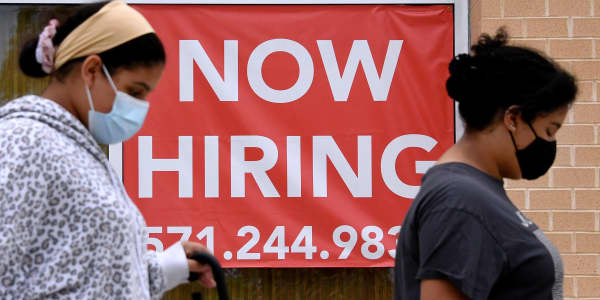Watching labor data on Black workers in the U.S. can offer helpful clues about the strength — or weakness — of the economy, and even signal changes before they show up in the headline print.
That's because Black workers are more able to find employment in strong labor markets and can be the first to lose their jobs when the economy weakens. Some of this is due to structural racism in the U.S. as well as over-representation of Black workers in low wage jobs and industries that tend to be hit hardest in downturns, such as hospitality and construction.
"Black workers are the canary in the coal mine — are you actually hiring people?" said Bill Spriggs, chief economist at the AFL-CIO.
The group generally faces higher unemployment and more difficultly in securing work than their white and Asian peers.
"The Black unemployment rate continues to be the highest, indicating that Black workers are facing more challenges, having a more difficult time securing employment," said Valerie Wilson, director of the Economic Policy Institute's program on race, ethnicity and the economy.
The rates of their employment also are more sensitive to the broader economy and move more when changes occur, Wilson said.
"We know that for every one percentage point change in the national unemployment rate, we typically get close to a two percentage point change in the Black unemployment rate," she said.
Breaking down the U.S. labor market
The U.S. labor market has been a source of confusion, and perhaps even frustration, as of late. While adding jobs is a good thing, it also signals to the Federal Reserve that its inflation-fighting rate hikes may have not slowed the economy enough to achieve its goal.
Friday's January jobs report showed that employers added 517,000 jobs during the month, blowing past a Dow Jones consensus estimate of 187,000. At the same time, the overall unemployment rate fell to 3.4%, the lowest since 1969.
Looking at the data on Black workers shows some potentially promising signs.
The Black unemployment rate is sensitive to the labor market strengthening, which may be part of the reason it fell to 5.4% from 5.7% in January. Unemployment rates for white and Asian workers increased, though they remain at lower levels.
Other good signs in the report include the labor force participation rate and employment-to-population ratio, both of which increased in January for Black workers.
Spriggs has been closely watching these figures as any lag in Black workforce participation amid an otherwise strong labor market signals that employers aren't as eager to hire as they say — and that jobs listed as open may not be readily available for workers looking for positions.
"When firms aren't really hiring, workers that have been looking the longest give up," he said.
The data on Black workers reentering the labor force and finding jobs has been relatively stable, said Wilson. For now, that's a good sign that the labor market is indeed strong and benefiting the workers on the margins.
Of course, one month of data does not make a trend, said Wilson. It's also likely that the January report could be revised lower.
What's next
Economists will continue to watch employment figures as well as inflation data to gauge what the Federal Reserve may do at its March meeting. Earlier this week, policymakers handed down a 0.25 percentage point rate hike, in line with consensus, and noted that they see disinflation beginning.
After today's jobs report, the question is whether the Fed will raise rates more aggressively at its next meeting.
Spriggs worries about further hikes, as he sees a potential policy mistake by the Fed as the most damaging for Black workers, especially low wage ones.
"When you slow down job growth, you affect these vulnerable groups first," he said, adding that it seems at times the Fed wants to push the U.S. into recession to quell inflation, overlooking a soft landing.
"The Fed mistakenly believes that if they get it wrong, it will all correct itself," said Spriggs, noting that the thinking is that laid -off workers will be able to claim unemployment to make up for lost wages.
The reality is, however, that states have tightened those systems, especially since the pandemic. And, the states with the most regressive unemployment insurance policies are those where most Black workers reside, Spriggs said.
"If they're wrong, this will have a huge disproportionate burden on Black workers," he said.







